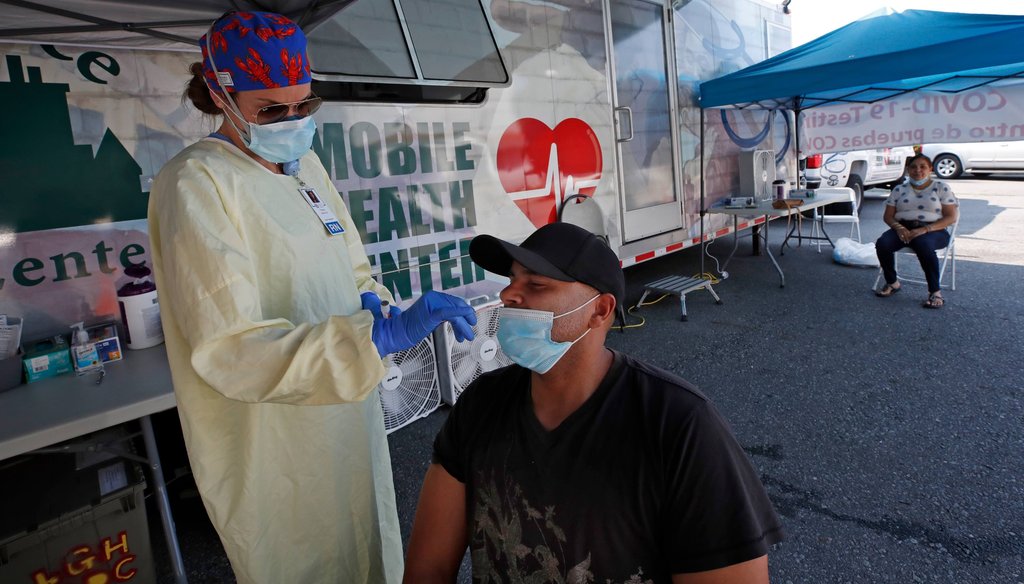

Our only agenda is to publish the truth so you can be an informed participant in democracy.
We need your help.


Nurse Tanya Markos administers a coronavirus test on patient Juan Ozoria at a mobile COVID-19 testing unit on July 2, 2020, in Lawrence, Mass. (AP)
Polymerase chain reaction (PCR) tests are among the most common and reliable ways to test for the coronavirus.
These tests look for the genetic material of the coronavirus in a sample that’s typically taken from a person’s nose or throat. Health care providers use them to confirm whether someone has the disease.
The United States has ramped up its COVID-19 testing capacity this summer in an effort to slow the spread of the virus. Some bloggers and Facebook users say that’s a mistake.
In a June 27 article, a website called OffGuardian wrote that the tests many health care providers use to diagnose COVID-19 are "scientifically meaningless."
"These PCR tests are meaningless as a diagnostic tool to determine an alleged infection by a supposedly new virus called SARS-CoV-2," reads the article, which has been shared more than thousands of times on Facebook.
The article was flagged as part of Facebook’s efforts to combat false news and misinformation on its News Feed. (Read more about our partnership with Facebook.) It has also been copy-pasted into text posts, which have also been shared thousands of times.
(Screenshot from Facebook)
OffGuardian was launched in 2015. The site’s name comes from the fact that its founders were all "banned from the Guardian’s ‘Comment is Free’ sections," according to its about section.
OffGuardian has a track record of publishing conspiracy theories and Russian propaganda, so we wanted to take a closer look at its claim about COVID-19 testing.
The article is inaccurate — polymerase chain reaction (PCR) tests are among the most common and reliable ways to test for the coronavirus. Similar claims have circulated, and have been fact-checked, since March.
There are three main coronavirus tests: diagnostic, antibody and antigen. Diagnostic tests, also known as PCR tests, look for the genetic material of the coronavirus in a sample that’s typically taken from a person’s nose or throat. Health care providers and public health officials use them to confirm whether someone has the disease.
In a fact sheet for its PCR test, the Centers for Disease Control and Prevention says the test is "designed to detect the virus that causes COVID-19 in respiratory specimens, for example nasal or oral swabs."
"If you have a positive test result, it is very likely that you have COVID-19," the document says.
That’s because PCR tests amplify small segments of DNA, making it easier for labs to test for the presence of SARS-CoV-2, the virus that causes COVID-19. Health care providers have also used them for detecting viruses like HIV. It usually takes several days to get results.
In its 4,500-word article, OffGuardian lays out several (inaccurate) theories about PCR tests. None of them prove that the tests are "scientifically meaningless."
OffGuardian wrote in its article that the inventor of the PCR test, Kary Mullis, "regarded the PCR as inappropriate to detect a viral infection." In a fact-check, Reuters rated that claim false — the source is a 1996 article about HIV/AIDS. It does not say PCR tests are ineffective for detecting viruses.
OffGuardian makes several other inaccurate claims in its article, including:
"There are no distinctive specific symptoms for COVID-19." The CDC says otherwise.
"The existence of SARS-CoV-2 RNA is based on faith, not fact." Several researchers have analyzed the genetic material of the coronavirus — including its RNA.
Between 22% and 77% "of the ‘positive’ tests are false ‘positives.’" Currently, about 92% of tests in the United States produce negative results.
RELATED: Coronavirus testing: What we know, all in one place
There are legitimate questions about the accuracy of diagnostic COVID-19 tests, particularly for people who are not experiencing symptoms. There have been several cases of tests producing the wrong results, and some experts are concerned about false-negatives.
But OffGuardian’s claim about PCR tests is inaccurate and ridiculous. We rate it Pants on Fire!
Centers for Disease Control and Prevention, "FACT SHEET FOR PATIENTS: CDC - 2019-nCoV Real-Time RT-PCR Diagnostic Panel," June 12, 2020
Centers for Disease Control and Prevention, Symptoms of Coronavirus, accessed July 6, 2020
CrowdTangle, accessed July 6, 2020
Facebook post, July 4, 2020
Facebook post, July 5, 2020
Food and Drug Administration, Emergency Use Authorization, accessed July 6, 2020
Gene Reports, "Genomic characterization of a novel SARS-CoV-2," June 2020
Michigan Health Lab, "What the SARS-CoV-2 Genome Reveals," May 15, 2020
Microbiology Resource Announcements, "Complete Genome Sequence of a 2019 Novel Coronavirus (SARS-CoV-2) Strain Isolated in Nepal"
National Center for Biotechnology Information, Severe acute respiratory syndrome coronavirus 2 isolate Wuhan-Hu-1, complete genome
National Human Genome Research Institute, Polymerase Chain Reaction (PCR) Fact Sheet, accessed July 6, 2020
OffGuardian, "COVID19 PCR Tests are Scientifically Meaningless," June 27, 2020
PolitiFact, "Coronavirus testing: What we know, all in one place," May 5, 2020
Reuters, "Fact check: Inventor of method used to test for COVID-19 didn’t say it can’t be used in virus detection," July 3, 2020
Science Feedback, "PCR tests for COVID-19 are specific for the novel coronavirus SARS-CoV-2 and do not detect other coronaviruses, contrary to claims in viral article and video," April 6, 2020
Stanford Health Care, Polymerase Chain Reaction (PCR) for HIV, accessed July 6, 2020
StopFake, "Russian trolls exiled from Guardian find home for their hate," Sept. 3, 2018
Teyit, "Were PCR tests wrong 50%?" June 25, 2020
In a world of wild talk and fake news, help us stand up for the facts.
